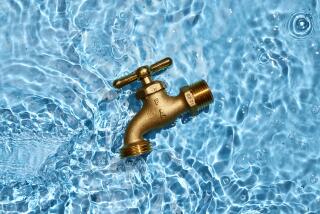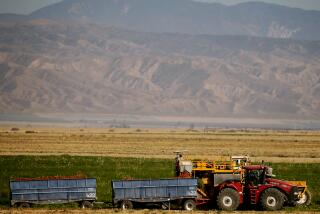Tucson Voters Face Unusual Water Question: Whether to Dump It
TUCSON, Ariz. — It took 20 years and billions of dollars to bring Colorado River water to Tucson. It took only three years, a funny taste and some burst pipes for voters to restrict its use.
On Tuesday, Tucson residents again go to the polls, this time to decide whether to dump the once-prized water into dry stream beds and washes or let die a ban that kept it out of their taps.
In a desert city sitting on a finite ground-water supply, the question seems easy to answer, especially since rapid growth is steadily bringing in more thirsty people.
Not so.
“Control of water is power here,” said Rich Wiersma, executive vice president of the Citizens Alliance for Water Security, which is backing the ballot measure to extend the 1995 ban on direct delivery of the Colorado River water to people’s homes. “There’s a lot of people fighting over that power.”
Tucson is the largest city in the nation still entirely dependent on ground water for its drinking supply. It also feeds golf courses and sustains the lush lawns and tile-roofed subdivisions replacing the natural desert terrain.
The Central Arizona Project (CAP), a 336-mile canal system, was created in part to relieve the city’s reliance on its dwindling natural supply by bringing in Colorado River water to either supplement or replace it. Local, state and federal governments are footing the $4.7-billion bill.
But when Tucson Water first tried to send CAP water to its 630,000 customers in 1992, the utility failed to adjust the pH level to match existing supplies.
Because Colorado River water has more dissolved salts and minerals, it was more corrosive. The new water scoured old pipes, pumping sediment and smelly rust from old iron pipes out of people’s faucets. In some cases, it burst pipes.
Additionally, the extra minerals give the water a stronger taste, require bathers to use more soap and can build up faster in appliances such as evaporative coolers.
“We made a very serious error in the treatment method,” Tucson Water spokesman Mitch Basefsky said. “Ever since, we’ve been dealing with outrage and mistrust.”
Proponents of the ballot measure, Proposition 200, hate the taste of the water and worry about a repeat of the problems that plagued its first use here.
By filling the stream beds and washes, they argue, the water would seep into underground aquifers and be filtered naturally along the way. Then the wells that provide the city’s only other source of water could bring it back to customers.
“We deserve the best quality water,” Wiersma said.
Opponents say that the plan is scientifically flawed and that any water that does trickle underground would end up far away from city wells. In essence, it would be throwing the water away.
Resident Michele Tessier is fed up with the arguing.
“It’s getting way too messy and too complicated,” she said. “I think that they should use the CAP water as long as it’s healthy.”
Tessier has a private well at her home, but wants the Colorado River water available when it dries up.
Although Basefsky admitted there is a general feeling in the community that CAP water is bad, he said the Colorado River water is of very high quality.
About 25 million people in California, Nevada and Phoenix use and drink Colorado River water each day, he said.
Still, because of the problems in Tucson, deliveries were halted in 1994 and the following year voters approved a ballot measure that prevented Tucson Water from delivering CAP water directly to customers for five years.
Although the utility has used some water in an Avra Valley recharge project, the $85-million plant it built to treat the water has been shut down ever since.
Count Bill Staggs among those who are satisfied with the way things are. He received Colorado River water at his home and doesn’t want any more.
“We had nothing but trouble. Odor, stuff coming out, it stopped up our [evaporative] cooler. It was a mess,” he said. “I wouldn’t want to take a chance on it again.”
Ultimately, Staggs and other residents may not have a choice.
City attorneys have already prepared to challenge Proposition 200. Their analysis argues that the ballot measure violates the state Constitution and city charter by withholding elected officials’ salaries for noncompliance, limiting when the measure could be repealed or amended, and requiring more than a simple majority of the City Council and mayor to raise water rates.
Then there’s the water supply itself.
Left as it is, Tucson’s ground water supply could be used up by the year 2020, said Barbara Tellman, a senior research specialist at the University of Arizona Water Resources Research Center.
“You’ve got a finite supply of water,” she said. “As growth continues, we will run out. The question is how soon.”
More to Read
Sign up for Essential California
The most important California stories and recommendations in your inbox every morning.
You may occasionally receive promotional content from the Los Angeles Times.










